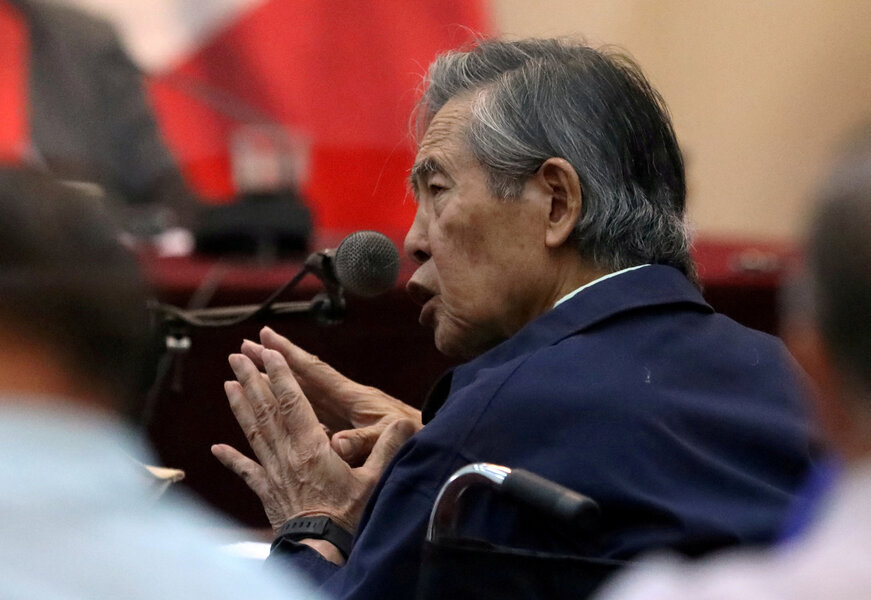Peruvians divided as ex-president, jailed for massacres, walks free
Loading...
| Lima, Peru
Former Peruvian President Alberto Fujimori, who was serving a 25-year prison term for human rights abuses during his decade-long rule in the 1990s, was released from jail late on Wednesday despite criticism from an international human rights court.
Peru’s highest court on Dec. 5 ruled in favor of an appeal to restore a 2017 pardon for Mr. Fujimori on humanitarian grounds. The Inter-American Court of Human Rights (IACHR) had earlier requested the move be blocked.
Mr. Fujimori served around 16 years after being extradited from Chile in 2007.
The former president, whose doctors say has serious health issues, was filmed leaving the prison wearing a breathing tube and a mask. His children hugged him before he got into a car, which took him to the home of his eldest daughter and political heiress Keiko.
“Today we finally have our father home,” Keiko said through a megaphone at the door of her home, where her father is now expected to reside. “There is no hatred or resentment in my heart, but gratitude.”
As Mr. Fujimori left the prison, local TV footage showed a crowd of supporters cheering and pushing against his car as it tried to leave the prison’s premises on the outskirts of Lima.
“It was time for this injustice against Fujimori to end, thanks to him our country is on its feet,” Catalina Ponce, a Fujimori supporter waiting outside the prison, said earlier in the day.
Supporters of Mr. Fujimori believe he saved Peru from terrorism and economic collapse.
Critics, however, say he abused democracy and committed atrocities during his government’s battle against the Shining Path guerrillas.
Mr. Fujimori was convicted in 2009 of ordering the massacre of 25 people in 1991 and 1992 while his government fought the Shining Path.
The first of the two massacres he is accused of plotting occurred in 1991 in a poverty-stricken Lima neighborhood, according to The Associated Press. Hooded soldiers fatally shot 15 residents, including an 8-year-old child, who had gathered at a party.
Then, in 1992, the clandestine military squad kidnapped and killed nine students and a professor from the Enrique Guzmán y Valle University. Forensic experts reported the victims were tortured, shot, and buried in common graves.
“We live in an orphanhood because we do not have institutions of any kind capable of defending us,” Gisela Ortiz, sister of one of the victims for whom Mr. Fujimori was convicted, told the AP. “Peru gives the image of a country where the rights of victims are not guaranteed and where human rights issues have no importance.”
The accusations against Mr. Fujimori have led to years of legal wrangling, according to the AP. He resigned just as he was starting a third term and fled the country in disgrace after leaked videotapes showed his spy chief, Vladimiro Montesinos, bribing lawmakers. Mr. Fujimori went to Japan, his parents’ homeland, and sent in his resignation by fax.
Five years later, he stunned supporters and enemies alike when he flew to neighboring Chile, where he was arrested and extradited to Peru. Mr. Fujimori’s goal was to run for Peru’s presidency again in 2006, but instead, he was put on trial.
But he was pardoned on Christmas Eve in 2017 by the president of the time, Pedro Pablo Kuczynski. Mr. Fujimori walked free for about nine months before a court declared it null.
Since then, the pardon has been repeatedly annulled or suspended by lower courts after pressure from the Inter-American Court and victims’ families. Peru’s constitutional court restored the pardon earlier this week.
Shortly after the order, the president of the Inter-American Court asked Peru to stop the pardon until it had “all the necessary elements” to analyze whether conditions were met.
The AP reported that United Nations human rights commissioner Volker Turk on Dec. 6 said the Constitutional Court’s order to release Mr. Fujimori “is a worrying setback,” adding that “any humanitarian release of those responsible for serious human rights violations must be in accordance with international law.”
Mr. Fujimori’s release comes as approval for the government of President Dina Boluarte has sunk into single-digits and to its lowest level in the year since her predecessor was ousted.
Ms. Boluarte is also facing a constitutional complaint by the country’s attorney general for dozens of deaths that took place during anti-government protests after she took office.
This story was reported by Reuters. Material from The Associated Press was used in this report.





